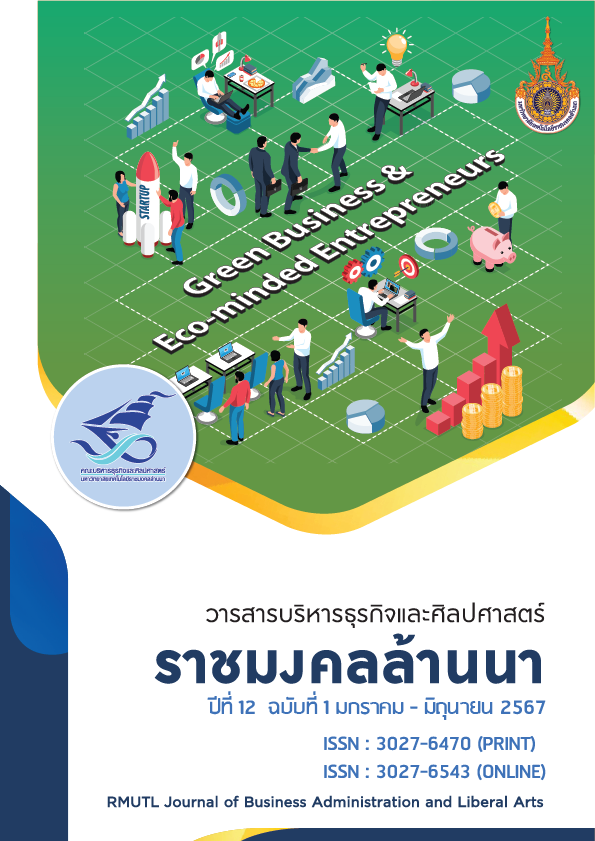Factors Affecting the Survival of Micro Restaurant Business Entrepreneurs After the Outbreak of the COVID-19 Virus in the Muang District, Chiang Mai Province
Main Article Content
Abstract
The aim of this study is to investigate the survival of micro-enterprises in the hospitality industry after the outbreak of coronavirus disease (COVID-19) in Mueang district, Chiang Mai province. 370 sample locations were selected using the simple random sampling method. A questionnaire was used as a data collection tool. Data analysis and statistical evaluations were carried out using existing computer programs. Statistical methods used in the data analysis included percentages, means, standard deviations, tests for differences in means (T-test), one-way ANOVA and multiple linear regression analyses (multiple regression) using the Enter method.
The study found that individual factors such as gender, age, education level, and differing work experiences, as well as business factors including the type of food service, restaurant location, duration of business operation, number of employees, and average monthly income, significantly affect the survival of micro restaurant entrepreneurs at a significance level of 0.05. Regarding the survival factors of restaurant entrepreneurs, it was found that management factors, including human resource management, marketing variables, and the leadership of the restaurant owner, significantly impact the survival of the restaurant business at a 0.05 statistical significance level. The findings of this study indicate that during crises, restaurant entrepreneurs still have to bear various operational costs. Human resource management is crucial for entrepreneurs in crises. Entrepreneurs need to manage their time, employees, and welfare effectively while considering cost management to ensure the business's survival.
Article Details

This work is licensed under a Creative Commons Attribution-NonCommercial-NoDerivatives 4.0 International License.
บทความวิจัยนี้เป็นของลิขสิทธิ์
References
กันยารัตน์ หลายแห่ง. (2556). กลยุทธ์การปรับตัวเพื่อความอยู่รอดของร้านค้าปลีกแบบดั้งเดิมในเขตอำเภอเมือง จังหวัดนครปฐม. (วิทยานิพนธ์บริหารธุรกิจมหาบัณฑิต). กรุงเทพฯ : มหาวิทยาลัยศิลปากร.
โชติ บดีรัฐ. (2558). เทคนิคการบริหาร. กรุงเทพฯ: โรงพิมพ์แห่งจุฬาลงกรณ์มหาวิทยาลัย.
ธนพนธ์ อัศวศิริโรจน์, กองกูณฑ์ โตชัยวัฒน์ และสิทธิชัย นาคสุขสกุล. (2567). การศึกษาปัจจัยที่ส่งผลต่อความอยู่รอดของผู้ประกอบการรับเหมาก่อสร้างขนาดกลางและขนาดย่อมในเขตกรุงเทพมหานคร. 11" Built Environment Research Associates Conference, BERAC2020 Bangkok, Thailand, June 25th, 2020.
นฤมล สุ่นสวัสดิ์. (2560). ปัจจัยที่ส่งผลสำเร็จในการบริหารธุรกิจขนาดกลางและขนาดย่อม ตามแนวคิดปรัชญาเศรษฐกิจพอเพียง. วารสารสารสนเทศ, 16(1), 113-123.
ณฐภศา เดชานุเบกษา ปริญญา และทองคำ ธนาภรณ์ทัศนภักดิ์. (2464). ความคาดหวังของสถานประกอบการในการทำข้อตกลงความร่วมมือในการร่วมผลิต บัณฑิตกับหลักสูตรแบบบูรณาการกับการทำงาน. (สาขาวิชาธุรกิจดิจิทัล คณะวิทยาการจัดการ). มหาสารคาม : มหาวิทยาลัยราชภัฏมหาสารคาม.
ปิ่นฤทัย สุธีรพงศ์ และกุลเชษฐ์ มงคล. (2564). โมเดลความสัมพันธ์เชิงสาเหตุของความสำเร็จธุรกิจขนาดกลางและขนาดย่อมในกรุงเทพมหานคร.(ปริญญาบริหารธุรกิจมหาบัณฑิต). กรุงเทพฯ : มหาวิทยาลัยศรีนครินทรวิโรฒ.
พูนพงษ์ นัยนาภากรณ์. (2566). คิดเห็นแชร์ : ความท้าทาย และการปรับตัว เพื่อความอยู่รอดของร้านอาหารและเครื่องดื่มในประเทศไทย, มติชนออนไลน์. สืบค้น 1 ตุลาคม 2566, จาก https://www.matichon.co.th/economy/news_4206039.
พันธนีย์ ธิติชัย และภันทิลา ทวีวิกยการ. (2564). รายงานผลการทบทวนสถานการณ์โรคโควิด-19 และมาตรการควบคุมป้องกันในระดับโลกและในประเทศไทย. กรุงเทพฯพัทธมน ธุระธรรมานนท์. (2564). ปัจจัยธุรกิจ คุณลักษณะของผู้ประกอบการ และการสร้างความได้เปรียบทางการแข่งขัน ที่นำไปสู่ความสำเร็จของธุรกิจเบเกอรี่บนออนไลน์.(วิทยานิพนธ์มหาบัณฑิต). กรุงเทพฯ : มหาวิทยาลัยศรีนครินทรวิโรฒ.
ภีมภณ มณีธร. (2565). รายงานวิจัยเรื่องกลยุทธ์การปรับตัวเพื่อความอยู่รอดในช่วงวิกฤติการแพร่ระบาดของไวรัสโคโรนาของผู้ประกอบการธุรกิจในจังหวัดเชียงใหม่. (กองทุนมหาวิทยาลัยราชภัฏเชียงใหม่). เชียงใหม่: มหาวิทยาลัยราชภัฏเชียงใหม่.
ยลรวี ฉัตรศิริเวช. (2565). ปัจจัยที่ส่งผลต่อความอยู่รอดในมุมมองผู้บริโภคของร้านค้าปลีกหนังสือการ์ตูนญี่ปุ่น เขตปทุมวัน กรุงเทพมหานคร. (ปริญญาบริหารธุรกิจมหาบัณฑิต). กรุงเทพฯ: มหาวิทยาลัยศรีนครินทรวิโรฒ.
ยุทธ ไกยวรรณ์. (2561). หลักสถิติวิจัยและการใช้โปรแกรม. (พิมพ์ครั้งที่ 5). กรุงเทพฯ: สำนักพิมพ์จุฬาลงกรณ์มหาวิทยาลัย.
ลัดดา ปินตา. (2023). กลยุทธ์การปรับตัวของผู้ประกอบการธุรกิจ SMEs ในเขตภาคเหนือ เพื่อความอยู่รอดของธุรกิจภายใต้สถานการณ์การระบาดของเชื้อไวรัสโคโรนา (COVID-19). วารสารบริหารธุรกิจ มหาวิทยาลัยแม่โจ้, 5(1), 92–113. DOI: 10.14456/mjba.2023.5
ศูนย์วิจัยกสิกรไทย. (2563). ธุรกิจร้านอาหารปี 2564 ยังมีความเสี่ยงและความท้าทายสูง การเติบโตบนความเปราะบาง การลงทุนในธุรกิจยังคงต้องระมัดระวัง. ศูนย์วิจัยกสิกรไทย. (ออนไลน์). จาก https://bit.ly/3sK3HOU
สมทบ แก้วเชื้อ, บัณฑิต ผังนิรันดร์ และธนพล
ก่อฐานะ. (2562). ปัจจัยแห่งความสำเร็จของผู้ประกอบการธุรกิจออนไลน์ในยุคดิจิทัล. วารสารวิชาการเทคโนโลยีอุตสาหกรรม, 15(2), 33-44.
สว่างพงษ์ แซ่จึง. (2559). ปัจจัยแห่งความสำเร็จของผู้ประกอบการธุรกิจแฟรนไชส์ร้านอาหารไทยประเภทร้านก๋วยเตี๋ยวในเขตจังหวัดชลบุรี. (ปริญญานิพนธ์มหาบัณฑิต). ชลบุรี: มหาวิทยาลัยบูรพา.
สวลี วงศ์ไชยา และพีชญาดา พื้นผา. (2561). อิทธิพลของกลยุทธ์ธุรกิจและคุณลักษณะของผู้ประกอบการที่ส่งผลต่อความสำเร็จของธุรกิจขนาดกลางและขนาดย่อม. วารสารสมาคมนักวิจัย, 23(2), 139-152.
สุธีรา อะทะวงษา. (2560). การจัดการธุรกิจขนาดกลางและขนาดย่อม. เชียงใหม่: เชียงใหม่โรงพิมพ์แสงศิลป์.
สุวิทย์ อินเขียน. (2559). กลยุทธ์ที่มีความสัมพันธ์กับความสำเร็จของผู้ประกอบธุรกิจผลิตชิ้นส่วนเครื่องจักรในจังหวัดสมุทรปราการ. (ปริญญานิพนธ์มหาบัณฑิต). กรุงเทพฯ: มหาวิทยาลัยเทคโนโลยีราชมงคลธัญบุรี.
สุเมธ พิมพ์แก้ว. (2565). ปัจจัยที่ส่งผลต่อการปรับตัวเพื่อดำเนินธุรกิจในสถานการณ์การแพร่ระบาดของเชื้อโควิด-19 ของผู้ประกอบการ SMEs ในเขตกรุงเทพมหานครและปริมณฑล. (ปริญญาการจัดการมหาบัณฑิต). กรุงเทพฯ: มหาวิทยาลัยมหิดล.
สิทธิชัย ธรรมเสน่ห์. (2564). รูปแบบการบริหารจัดการธุรกิจร้านอาหารในยุคปกติวิถีใหม่สำหรับผู้ประกอบการ. กรุงเทพฯ: มหาวิทยาลัยราชภัฏสวนสุนันทา.
สำนักงานส่งเสริมวิสาหกิจขนาดกลางและขนาดย่อม. (2563). รายงานสถานการณ์ SME.
สำนักงานสภาพัฒนาเศรษฐกิจและสังคมแห่งชาติ. (2564). รายงานสถิติจังหวัดเชียงใหม่ พ.ศ. 2564 จังหวัดเชียงใหม่.
อาชนัน เกาะไพบูลย์ และเพ็ชรธรินทร์ วงศ์เจริญ. (2563). การปรับตัวของผู้ประกอบการท่ามกลาง COVID-19. สืบค้น 20 สิงหาคม 2563, จาก https://waymagazine.org/covid-policy-brief-3/
อรุณรัตน์ หลักฐาน และมนสิชา อินทจักร. (2563). ประสบการณ์ของผู้ใช้บริการร้านอาหารพื้นเมืองในจังหวัดเชียงใหม่. วารสารสังคมวิชาการ, 13(1), 139-147.
Carmeli, A., Meitar, R., & Weisberg, J. (2006). Self-leadership skills and innovative behavior. International Journal of Manpower, 27(1), 75-90.
Choudhary, A. I., Akhtar, S. A., & Zaheer, A. (2013). Impact of transformational and servant leadership on organizational performance: A comparative analysis. Journal of Business Ethics, 116(2), 433-440. DOI: 10.1007/s10551-012-1470-8.
Clow, K. E., & Baack, D. E. (2021). Integrated advertising, promotion, and marketing communications. (Global ed.). Pearson Education.
Dahlgaard, J. J., Kristensen, K., & Kanji, G. (1998). Fundamentals of total quality management. Chapman & Hall.
Jay, W., Aron, O. C., & Craig, J. (2006). Does industry matter? Examining the role of industry structure and organizational learning in innovation and brand performance. Journal of Business Research, 59(1), 37-45.
Jovanovic, B. (1982). Selection and the Evolution of Industry. Econometrical, 50, 649-670. DOI: 10.2307/1912606.
Kotler, P., & Armstrong, G. (2009). Principles of marketing. (13th ed.). Pearson.
Lechner, C., & Gudmundsson, S. V. (2014). Entrepreneurial orientation, firm strategy, and small firm performance. International Small Business Journal, 32(1), 36-60. DOI: 10.1177/0266242612455034
Scarborough, N. M. (2012). Effective small business management: An entrepreneurial approach. (10th ed.). Prentice Hall.
West, S. G., Finch, J. F., & Curran, P. J. (1995). Structural equation models with nonnormal variables: Problems and remedies. In R. H. Hoyle (Ed.), Structural equation modeling: Concepts, issues, and applications (pp. 56-75). Sage.

